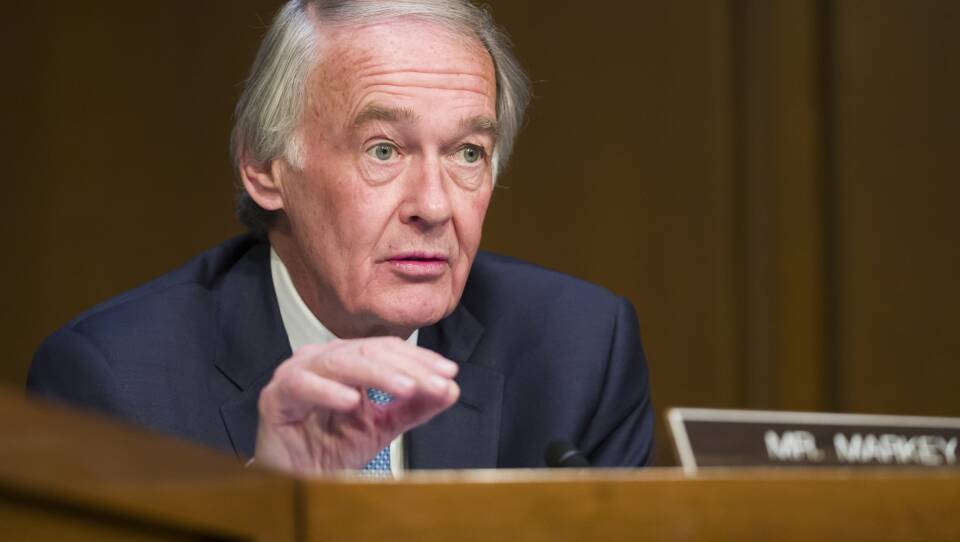As U.S. Rep. Joe Kennedy III continues his now-public debate over whether to challenge for U.S. Sen. Edward Markey's seat in 2020, a majority of the state Legislature — including the top leaders in both branches — are backing the incumbent.
Markey announced endorsements from 116 Democratic state lawmakers on Tuesday, one day after Kennedy confirmed he's been exploring a primary challenge and filed the fundraising paperwork necessary to launch one.
The list of supporters for Markey includes both House Speaker Robert DeLeo and Senate President Karen Spilka, longtime moderate figures such as Senate Ways and Means Committee Chairman Michael Rodrigues, and progressives such as Reps. Tami Gouveia and Mike Connolly.
"I am humbled to have the support of so many friends and colleagues across Massachusetts for re-election, and I pledge to fight for them and all communities in the Commonwealth every day," Markey said in a statement. "The people of Massachusetts have always been at the forefront of the challenges of our time — universal health care, same-sex marriage, earned sick time, equal rights — and I want to continue leading those fights in the United States Senate."
The legislative endorsements add to a busy week-plus of endorsements for Markey, who has announced the backing of U.S. Sen. Elizabeth Warren, NARAL Pro-Choice Massachusetts, and the Sunrise Movement as his primary race has attracted more attention.
Markey's announcement came around 1:45 p.m. Tuesday, just minutes after Kennedy made his first public appearance since he confirmed he is weighing a Senate run.
Speaking to reporters outside the Newton Fire Department, Kennedy declined to put a specific timeframe on when he would make a decision. He will wait, he said, "as long as it takes to come to the right decision."
"I don't think there's anybody out there that would think that today's environment, what we see across the country today, is the best this country can do, the best we can be," Kennedy said. "I think we can do better."
The 38-year-old grandson of Robert F. Kennedy denied that his potential challenge of the 73-year-old incumbent was about "age." He also declined to describe current Democratic leadership as a failed generation.
In fact, Kennedy spoke very little about Markey directly, instead touting the "new ideas" and "new approach" he would bring without offering specifics.
"Senator Markey is a good man," Kennedy said. "The reason I'm considering this race is there are still challenges that our country (faces), not just because of what Donald Trump does every single day, but fractures that were broken long before he was able to win an election and that, in fact, enabled him to win that election. If we are solely focused on what Trump does and not healing these wounds and making our country stronger, then shame on us."
While he continues to consider a potential run, Kennedy, who was first elected to the House in 2012, has prepared himself on in some ways: on Monday, shortly after publicly acknowledging his interest, he filed a form with the Federal Election Commission to create a "Kennedy for Massachusetts" Senate campaign committee.
Should Kennedy decide to commit, he would take on a long-familiar face in Congress. Markey, who has not had a primary challenger in almost two decades, spent 37 years as a congressman before winning a special Senate election in 2013.
Kennedy would also become the fourth candidate in the race. Both labor attorney Shannon Liss-Riordan and businessman Steve Pemberton have declared they will challenge Markey.
Pemberton took advantage of the Kennedy buzz on Tuesday, hosting his own press conference about 200 yards down the road immediately after the congressman finished speaking with reporters.
A former foster child whose mother died due to opioid addiction and whose father died to street violence, Pemberton said he does not believe the landscape of the primary would change significantly with Kennedy's addition.
"Though of different generations, I see the senator and the congressman as reflections of insiders and connections and the candidates of the privileged and the connected," Pemberton told the News Service. "I'm not that. I've never been that. I've been on the other end of that spectrum: forgotten about, not seen, not chosen, but crafted a life out of it that a lot of people in the commonwealth are trying to do today."




